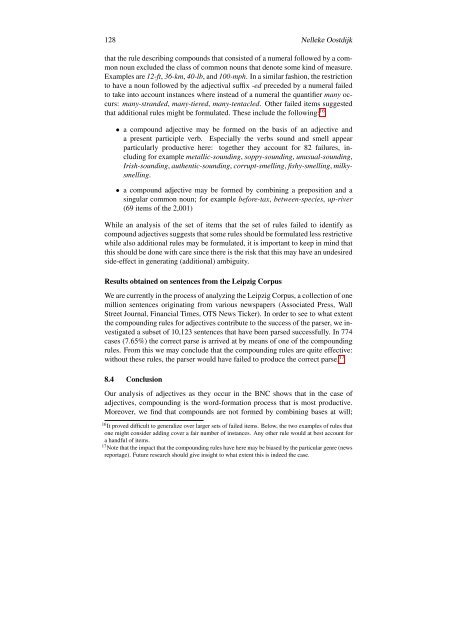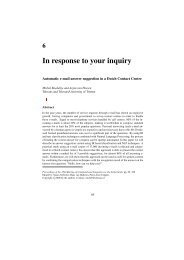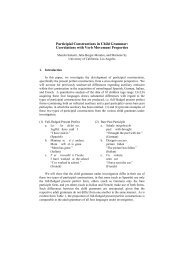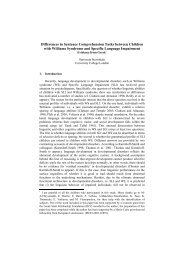Improving the lexical coverage of English compound adjectives
Improving the lexical coverage of English compound adjectives
Improving the lexical coverage of English compound adjectives
Create successful ePaper yourself
Turn your PDF publications into a flip-book with our unique Google optimized e-Paper software.
128 Nelleke Oostdijkthat <strong>the</strong> rule describing <strong>compound</strong>s that consisted <strong>of</strong> a numeral followed by a commonnoun excluded <strong>the</strong> class <strong>of</strong> common nouns that denote some kind <strong>of</strong> measure.Examples are 12-ft, 36-km, 40-lb, and 100-mph. In a similar fashion, <strong>the</strong> restrictionto have a noun followed by <strong>the</strong> adjectival suffix -ed preceded by a numeral failedto take into account instances where instead <strong>of</strong> a numeral <strong>the</strong> quantifier many occurs:many-stranded, many-tiered, many-tentacled. O<strong>the</strong>r failed items suggestedthat additional rules might be formulated. These include <strong>the</strong> following: 16• a <strong>compound</strong> adjective may be formed on <strong>the</strong> basis <strong>of</strong> an adjective anda present participle verb. Especially <strong>the</strong> verbs sound and smell appearparticularly productive here: toge<strong>the</strong>r <strong>the</strong>y account for 82 failures, includingfor example metallic-sounding, soppy-sounding, unusual-sounding,Irish-sounding, au<strong>the</strong>ntic-sounding, corrupt-smelling, fishy-smelling, milkysmelling.• a <strong>compound</strong> adjective may be formed by combining a preposition and asingular common noun; for example before-tax, between-species, up-river(69 items <strong>of</strong> <strong>the</strong> 2,001)While an analysis <strong>of</strong> <strong>the</strong> set <strong>of</strong> items that <strong>the</strong> set <strong>of</strong> rules failed to identify as<strong>compound</strong> <strong>adjectives</strong> suggests that some rules should be formulated less restrictivewhile also additional rules may be formulated, it is important to keep in mind thatthis should be done with care since <strong>the</strong>re is <strong>the</strong> risk that this may have an undesiredside-effect in generating (additional) ambiguity.Results obtained on sentences from <strong>the</strong> Leipzig CorpusWe are currently in <strong>the</strong> process <strong>of</strong> analyzing <strong>the</strong> Leipzig Corpus, a collection <strong>of</strong> onemillion sentences originating from various newspapers (Associated Press, WallStreet Journal, Financial Times, OTS News Ticker). In order to see to what extent<strong>the</strong> <strong>compound</strong>ing rules for <strong>adjectives</strong> contribute to <strong>the</strong> success <strong>of</strong> <strong>the</strong> parser, we investigateda subset <strong>of</strong> 10,123 sentences that have been parsed successfully. In 774cases (7.65%) <strong>the</strong> correct parse is arrived at by means <strong>of</strong> one <strong>of</strong> <strong>the</strong> <strong>compound</strong>ingrules. From this we may conclude that <strong>the</strong> <strong>compound</strong>ing rules are quite effective:without <strong>the</strong>se rules, <strong>the</strong> parser would have failed to produce <strong>the</strong> correct parse. 178.4 ConclusionOur analysis <strong>of</strong> <strong>adjectives</strong> as <strong>the</strong>y occur in <strong>the</strong> BNC shows that in <strong>the</strong> case <strong>of</strong><strong>adjectives</strong>, <strong>compound</strong>ing is <strong>the</strong> word-formation process that is most productive.Moreover, we find that <strong>compound</strong>s are not formed by combining bases at will;16 It proved difficult to generalize over larger sets <strong>of</strong> failed items. Below, <strong>the</strong> two examples <strong>of</strong> rules thatone might consider adding cover a fair number <strong>of</strong> instances. Any o<strong>the</strong>r rule would at best account fora handful <strong>of</strong> items.17 Note that <strong>the</strong> impact that <strong>the</strong> <strong>compound</strong>ing rules have here may be biased by <strong>the</strong> particular genre (newsreportage). Future research should give insight to what extent this is indeed <strong>the</strong> case.





